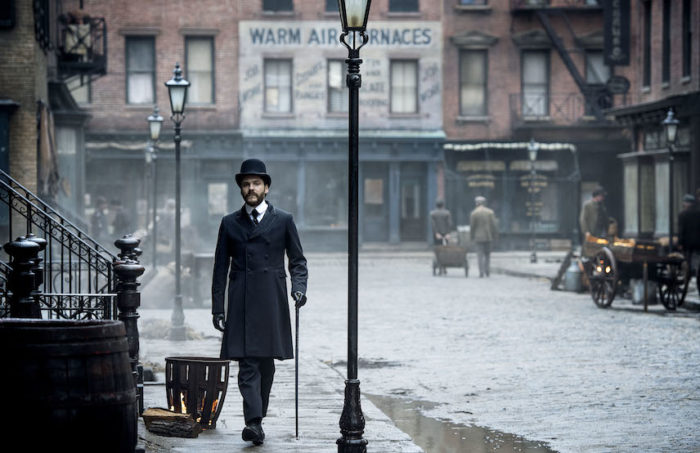The Alienist: A dark crime drama dripping with dread
Review Overview
Darkness
8Cast
8Originality
5David Farnor | On 17, Apr 2018
“I believe we all possess the raw material required to commit horrible acts. We just need the right, or wrong, combination of events to make the raw material combustible.” So declares Laszlo Kreizler (Daniel Brühl), The Alienist of the show’s title – a man who specialises in pathology. The show seems determined to prove his point from its opening minutes, which dive deep into the dark, disturbing underbelly of 1890s New York. The dawn of a new century is on the horizon, but this is a show that relishes the night before, skulking through alleys, loitering in houses of ill repute, and swooping through the eye holes of a dead boy’s corpse.
If the latter makes your stomach turn, this series comes with a warning sign the size of Dr. Laszlo’s ego: The Alienist is not for the faint-hearted, no sir. Based on the novel by Caleb Carr, and adapted by a team that includes True Detective’s Cary Fukunaga, this crime drama carries that series’ same penchant for graphic violence and unrelenting nastiness. If that makes you sit up and pay attention, say hello to your next Netflix box set.
Laszlo occupies himself by investigating a string of deaths involving young boys across the city – too grim to seem random, and too focused on eye sockets to be anything but connected. To get the most accurate depiction of the crime scene possible, Laszlo recruits John Moore (Luke Evans), a newspaper illustrator, to draw the first corpse we uncover. Drawn into the barbaric mystery together, their work puts them firmly in the way of the police, who are slow to find the culprit, despite the drive of Commissioner Roosevelt (Brian Geraghty) and the morals of Captain Connor (David Wilmot). With the Mayor and those from higher up frowning on the proverbial dirt being dug up, secretary Sara Howard (Dakota Fanning) takes it upon herself to do some sleuthing – an impromptu detective trio is born.
That ensemble alone is reason enough to tune into The Alienist, which is played with sombre straight faces by each member of the cast. All three are relative strangers to the world of TV, and so it’s a treat just to get the chance to soak up their facial expressions and physical nuances for several hours at a time. Evans is roguish and charming, in a way that recalls his scene-stealing Gaston in Beauty and the Beast, but has a vulnerable, serious side and a growing desire to put behind his womanising ways to show it. Brühl, meanwhile, is an outsider by choice, an “alienist” with a knack for alienating everyone around him, always probing and pushing others to unearth their secrets and drives. It’s a useful device in a detective, but not in a friend, and the series doesn’t miss a chance to make him rude – or point out that he doesn’t always have the answers. Moore is driven by shame, the doctor reasons correctly, but not the kind of shame he thinks.
While that might become insufferable on its own, The Alienist smartly balances out this intellectual machismo with Dakota Fanning’s Sara, who steals the show with her forthright, firm secretary – a woman who’s tired of being told what to do, think or say. Sara has her own vulnerabilities, not helped by the script, which stumbles in its decision to use her as the basis of a love triangle between our lead three – but Fanning overcomes both obstacles to make an impression, as her character emerges less as a romantic interest and more as a partner willing to put Laszlo in his place. One scene where he throws chalk against his blackboard in a strop is almost laughably childish – a welcome antidote to his portentous presence, which mostly involves him saying things like “I must follow where this goes, even to the darkest pit of Hell”.
So far, so typical of the kind of brooding intensity that this genre delivers. There’s a heavy dose of sex and brothels, because sex and brothels, and a lingering love of the city’s period sleaze. It’s elevated, though, by gorgeously cinematic visuals, particularly of the streets of Budapest, done up to look like 19th century New York – The Alienist has style by the gushing, red bucket.
But there’s more beneath the surface than you might expect, from a note of tragedy surrounding the young male victims’ profession and an insight into the early days of criminal procedure – graphology and fingerprints both get a fascinating look-in, thanks to the Isaacson brothers (Douglas Smith and Matthew Shear) – to themes of immigration and inequality in society. While we never really learn how Laszlo can afford his spiffy living arrangements, these details all spell promise for the season’s second half.
The mystery itself is played slow and long, to give us time to absorb the atmosphere. That doesn’t always pay off – by Episode 5, a breakthrough seems to have things in the bag – but it does give the series multiple chances to ramp up the horror and tension, and The Alienist doesn’t miss them; syphilitic sores scream at us in close-up, while organs are left in plain sight to taunt our doctor. (By the time Kreizler is arguing that Sara could become a murder if she pushed to it, you can believe her, if she had to face all of this every day.)
The result is a like an American answer to Ripper Street, the BBC-turned-Amazon drama that needed several seasons before it really found its form. The Alienist has similar potential, its world dripping with intrigue and its criminals dripping with dread. Every now and then, its slow-burn suspense crackles to life – one scene sees our troupe gather in a club, before realising they’re being watched by a sinister third party. You don’t notice until the moment’s gone that you’ve been on the edge of your seat.
The Alienist: Season 1 is available on Netflix UK, as part of an £9.99 monthly subscription.






















